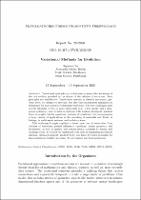Abstract
Variational principles for evolutionary systems take advantage of the rich toolbox provided by the theory of the calculus of variations. Such principles are available for Hamiltonian systems in classical mechanics, gradient flows for dissipative systems, but also time-incremental minimization techniques for more general evolutionary problems. The new challenges arise via the interplay of two or more functionals (e.g. a free energy and a dissipation potential), new structures (systems with nonlocal transport, gradient flows on graphs, kinetic equations, systems of equations)
thus encompassing a large variety of applications in the modeling of materials and fluids, in biology, in multi-agent systems, and in data science.
This workshop brought together a broad spectrum of researchers from
calculus of variations, partial differential equations, metric
geometry, and stochastics, as well as applied and computational
scientists to discuss and exchange ideas. It focused on variational
tools such as minimizing movement schemes,
optimal transport, gradient flows, and large-deviation principles for
time-continuous Markov processes, $\Gamma$-convergence and homogenization.

